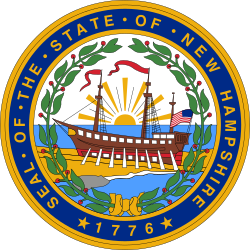November 2, 2004 | |||||||||||||||||
| |||||||||||||||||
Gregg: 50–60% 60–70% 70–80% 80–90% >90% Haddock: 50–60% 60–70% 80–90% Tie: 50% | |||||||||||||||||
| |||||||||||||||||
| Elections in New Hampshire |
|---|
 |
The 2004 United States Senate election in New Hampshire took place on November 2, 2004. Incumbent Republican Senator Judd Gregg ran for re-election. After winning the Republican primary, he faced Doris Haddock, a campaign finance reform activist. Haddock, 94 years old at the time of the election, would have been the oldest person to become a freshman Senator in history. [1] Gregg ultimately defeated Haddock in a landslide, winning 66 percent of the vote to Haddock's 34 percent. As of 2026, this is the last time that a male candidate won a U.S. Senate election in New Hampshire.



